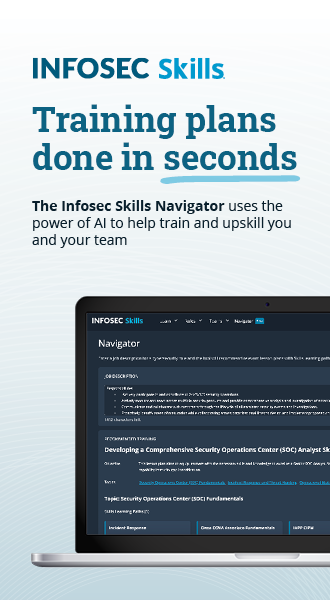Top 8 tips for office security when employees are working from home
Introduction: Who’s minding the store?
Cybersecurity has become even more high profile during the current COVID-19 pandemic. A recent warning from the UK National Cyber Security Centre and the US Department of Homeland Security talks of state-backed hackers targeting healthcare organizations. Many other examples of pandemic-focused cyberattacks have popped up since the coronavirus appeared.
But it is not just cyberattacks that threaten businesses. Research from US insurer Insureon points out that almost 9 % of small businesses were victims of a burglary in 2016. And real-world office security threats are an even bigger problem now, with business premises standing empty as workforces move to home offices during the lockdown.

FREE role-guided training plans
There are, however, business security systems and processes you can put in place to minimize your risk of a real-world attack.
8 tips for office security during the COVID-19 pandemic and beyond
The following eight tips to creating robust office security will hopefully help you compile your list of must-dos during COVID-19 lockdown. However, the measures are also a general guide to the use of building security systems during any period where an office may be empty.
-
Remote monitoring — it’s not just about theft
If you can’t physically be at your office, you can watch over it from afar. Modern IoT monitoring services allow you to utilize sensors to check various aspects of your building security.
When a premise is left empty, it is not just burglars that are a threat. Arson or accidental fires can happen. Make sure that you remove any combustible material from the office before you close. A building security system that employs sensors to monitor various aspects of an office environment can also help prevent accidental or malicious fires.
-
CCTV — building security system with eyes
Internet-connected cameras are an ideal office security measure to keep watch on your business premises remotely. Many systems are linked to a watch service which will receive an alert from the CCTV service if an intruder is identified. When you choose an IoT-enabled monitoring service, make sure that it has excellent cybersecurity features.
-
Mobile patrols/business watch schemes
You might want to consider using a mobile watch scheme or employ a professional patrol service to keep watch on your premises. This is especially useful if your buildings are in a high-risk area or you store valuable items.
-
Paper money safety
If you are a company that still keeps paper money in the office for sundry items, make sure it is locked away or put back into a bank.
-
Security hygiene and high-value items
If you have any high-value items, including documents, lock them away. Consider placing especially sensitive or valuable items in a bank vault. If you have digital versions of these items, make sure they are securely backed up.
-
Laptop locks
Laptops are attractive commodities for thieves. Opportunists who enter a building and discover laptops will be able to take their pick. Laptops also potentially contain sensitive data.
Either hide your laptops in a lockable place or use a laptop lock. The latter is a little like a bike lock: a long metal cable that connects the device to an immovable object.
-
Door locks!
It might sound like an obvious statement, but make sure your office and other buildings are locked up. Smart locks are an option; these are IoT devices that allow you to control locks from a mobile device.
Some of the smart lock products on the market have unique code entry systems. This provides a way to track anyone entering the building and could potentially be useful in an insider threat situation.
-
Light your way
Make sure that external lights are working; this can help deter intruders. Both external and internal lights can be internet-enabled. If you do use IoT lighting, you will be able to control it remotely from a device like a smartphone.
Top 4 ways to prepare your office for when lockdown ends
Using business security systems and office security is one thing, but once lockdown ends and the slow opening of business happens, we need to make sure our security strategy persists. This strategy now has to include the presence of coronavirus.
Four areas to think about on return to work are:
-
Social distancing
As much as possible, set out your office or floor to allow workers to use social distancing measures. This can be complicated by the modern open-plan office environment, but the whole idea of hot-desking feels wrong in the current climate.
One possible way to deal with this is to use a shared home working/office working rota or stagger hours; this helps to space out numbers of employees in the actual workplace at any one time.
-
Deep cleaning
Use a deep-cleaning service to clean any areas that are at a high risk of infection. Make sure the service is set up to deal with coronavirus and that cleaners are properly protected using PPE.
-
Employee symptom monitoring
If you employ an occupational health service or nurse, they will be able to monitor employees for any signs of COVID-19. If you don’t have access to a dedicated service, you can assign an individual (perhaps your health and safety officer) to keep track of any potential infection. You should consider having a policy in place to deal with employee infection.
-
COVID-19 tracing apps
A number of COVID-19 tracing apps are becoming commercially available. Some are being rolled out at a national level. These apps will notify individuals if they have been in close contact with a COVID-19 sufferer who has been tested or even just showing symptoms. The app will then advise an individual to self-isolate for 14 days.
Conclusion
Disaster recovery isn't just about digital — it’s about the entire workplace. With the specter of COVID-19 hanging over the heads of businesses for the foreseeable future, being prepared to deal with all aspects of the virus impact must become part of our ongoing business strategy.

Get your guide to the top-paying certifications
With more than 448,000 U.S. cybersecurity job openings annually, get answers to all your cybersecurity salary questions with our free ebook!
Sources
- Alert (AA20-126A), CISA
- Survey: 1 in 3 small businesses faced top hazards last year, Insureon
- High level privacy and security design for NHS COVID-19 contact tracing app, National Cyber Security Centre









